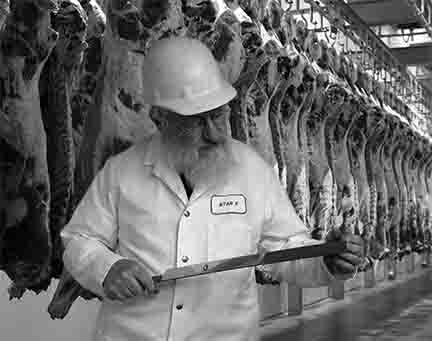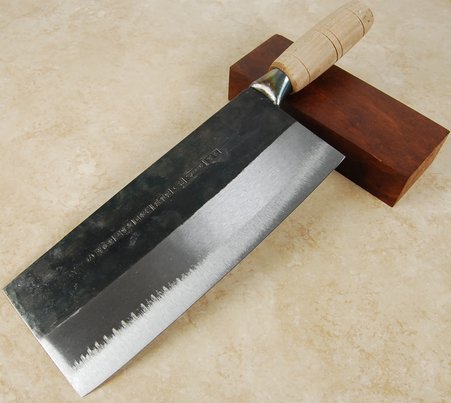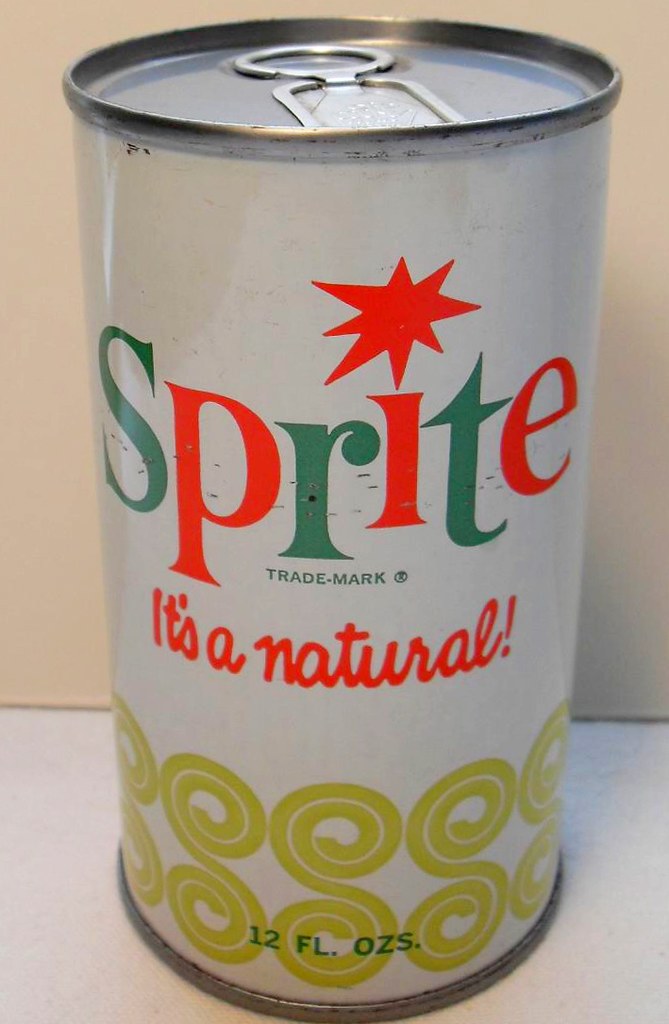Beitza 28b
1- שחיטה – Halacha trusts any Jew to check the knife, based upon the rule of עד אחד נאמן באיסורין. Nevertheless the חכמים established that after checking the knife himself, a shochet must present his knife to a חכם for him to inspect it for him, as well.

The reason is to show respect for the חכם and in order to ensure that the inspection be done by an experienced person who is careful and deliberate in halachah. Another reason some add is due to the fact that the art of detecting a small defect on the blade often takes a great degree of focus and the shochet is often under pressure. Thus the requirement for the חכם.
2- We mentioned the Rosh (Chullin, Ch. 1, #24) who writes that in his day it was uncommon for individuals to do שחיטה themselves, and it was entrusted to designated professionals who were scrupulous and careful.

amateur
The חכמים deferred to these trained שוחטים and did not require the knives to be brought to them to be inspected. However, the halachah never dispensed with the need for individuals to present their knives to a חכם.
והאידנא נהיגי שאין מראין סכין לחכם כי בימיהם היו הקצבין שוחטין בעצמם כדאמרינן האי טבחא דלא סר סכינא. והשתא נהוג בכל גלות ישראל שאין מאמינים לקצבים וממנים אנשים ידועים על השחיטה ועל הבדיקה ולהם מחלו חכמים את כבודם כי הן זריזין וזהירין

expert
3- שחיטה ביום טוב . Our Gemara says that one may not bring a Shochet’s knife to a Chacham to have it inspected on Yom Tov, but a Chacham may inspect his own knife – and loan it out.
Why may one not show a knife to a Chacham on Yom Tov?
(a) RASHI writes that the act of bringing the knife to the Chacham has the appearance of a weekday activity (“Uvda d’Chol”). It looks as though one intends to slaughter a lot of animals for public sale.
Accordingly, a Chacham is permitted to inspect his own knife because the inspection is not done in a public manner – Rashi: – in his own home, his own knife, low profile.

(b) The RAMBAM (Hilchos Yom Tov 4:9) writes that the prohibition is due to the concern that one might sharpen the knife if the Chacham tells him that it is not perfectly sharp. A Chacham may inspect his own knife, however, because just as he is a Chacham and knows how to inspect a knife, he also knows that one is not permitted to sharpen a knife on Yom Tov.
ומפני זה אסרו להראות סכין לחכם ביום טוב שמא תהיה פגומה ויאמר לו אסור לשחוט בה משום פגימתה וילך ויחדדנה במשחזת.

(c) The RIF writes in the name of the BEHAG that the prohibition is due to the concern that one will carry the knife outside of his permitted Techum in order to bring it to the Chacham. For that reason, a Chacham may inspect his own knife (as he does not need to carry it anywhere).
The BA’AL HA’ME’OR, – רבינו זרחיה הלוי asks that the reason of the Rif is logical only according to the opinion that the prohibition of Techumin is mid’Oraisa. However, according to the opinion that the prohibition of Techumin is mid’Rabanan, a prohibition against taking the knife to a Chacham would be a Gezeirah l’Gezeirah (a rabbinical decree made to safeguard another decree), which the Rabanan do not enact.
The RAMBAN (in Milchamos) answers that in this case the Rabanan made an exception to the normal rule and they enacted a Gezeirah l’Gezeirah, because it is particularly common that a person goes out of his Techum to show his knife to the Chacham, since he frequently brings his knife to the Chacham on ordinary weekdays (because one may not slaughter an animal without first giving his knife to a Chacham for inspection).
(d) The BA’AL HA’ME’OR (cited by the RAN) writes that one may not show a knife to a Chacham on Yom Tov because the Chacham’s ruling about the knife is included into the category of passing judgment (“Dan Es ha’Din”) which is prohibited on Yom Tov.
פירש דראיית סכין כראיית בכור הוא שהן מעכבות השחיטה ונראה כמתקן ודן את הדין
The same reason prohibits one from showing a blemish on a בכור to an expert on Yom Tov.
The RAMBAN asks that if the Chacham’s decision about the knife is considered a judgment, then why may he inspect his own knife?
The RAN answers that when the Chacham examines his own knife, he merely clarifies (“Giluy Milsa”) whether or not it has a blemish; he does not pass a formal ruling. In contrast, when another person brings a knife to the Chacham for inspection, he does so because the Rabanan instituted that one may not slaughter an animal without first showing the knife to a Chacham (this enactment was made in order to preserve the honor of the Chacham; see Rashi to Chulin 9a).
כדי ביקור חכם – לבדוק הסכין שהטבח צריך להראות הסכין לחכם העיר מפני כבוד החכם כדאמרינן לקמן (דף י:) אע”ג שהטבח בקי בהלכות בדיקה
Part of the enactment is that the Chacham must issue a Halachic ruling about the knife before the person may use it, and thus the Chacham’s ruling is considered passing judgment. When a Chacham inspects his own knife, he does not do so because of any enactment of the Rabanan. He merely wants to clarify whether the knife is blemished or not.

4 – We learned again the famous machlokes of ר’ יהודה and the חכמים regarding מכשירין – ancillary melachos which the chachamim prohibit but R’ Yehuda allows. This lead to a discussion about opening bottles on Yom Tov, which is problematic because of various potential איסורים – and we mentioned Rav S.Z. Auerbach who permits this on Shabbos. because מכה בפטיש does not apply to any כלי which will be discarded after has been emptied.
He also says that מחתך does not apply when lifting off the cover off a can, since the intention is not create a tab of a specific size.
Thank you to R Moshe Heber who mentioned the time the Rebbe opened a bottle in front of all by the farbrengen clearly indicating that it was permissible.


5- We began to talk about the 2 תקופות and may continue next week.
http://www.likras.org/files/2481_22874.pdf
22 דף 229